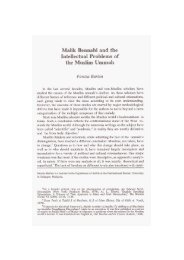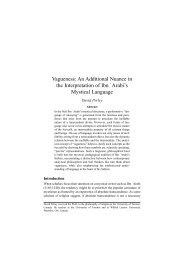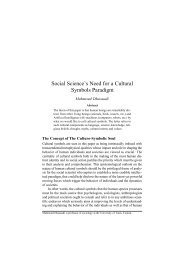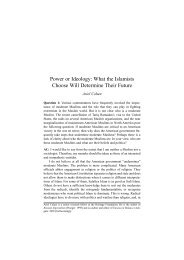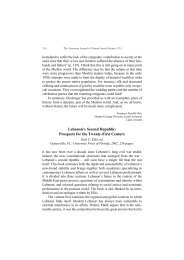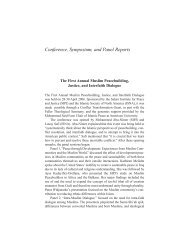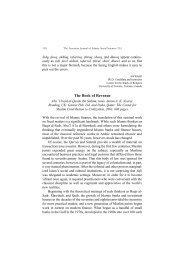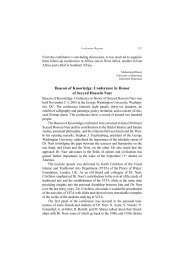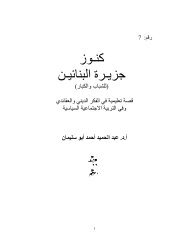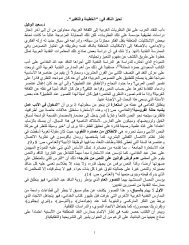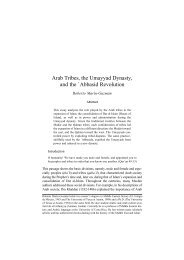The Chinese Sultanate: Islam, Ethnicity, and the ... - I-Epistemology
The Chinese Sultanate: Islam, Ethnicity, and the ... - I-Epistemology
The Chinese Sultanate: Islam, Ethnicity, and the ... - I-Epistemology
Create successful ePaper yourself
Turn your PDF publications into a flip-book with our unique Google optimized e-Paper software.
Book Reviews 111<br />
Administrative differentiations in Yunnan’s populations equally make<br />
sense to <strong>the</strong> self-perceived Han identity. Since <strong>the</strong> Han, new or old, belonged<br />
to <strong>the</strong> st<strong>and</strong>ard administration of interior regions <strong>and</strong> were <strong>the</strong> largest group<br />
of min subject populations, it is not surprising that <strong>the</strong>y equated <strong>the</strong>mselves<br />
with <strong>the</strong> whole loyal commoner population. Thanks to Yunnan’s multiethnic<br />
setting, <strong>the</strong> state also overlapped <strong>the</strong> Han with <strong>the</strong> commoner so that,<br />
as Atwill discusses in <strong>the</strong> fourth chapter, it expressed its early concern over<br />
trouble-maker commoners via an ethnic term: Han-jian (Han traitor). Later<br />
on, along with <strong>the</strong> accelerated violence directed against <strong>the</strong> minority populations,<br />
<strong>the</strong> Han opportunistically identified <strong>the</strong>mselves as good commoners<br />
<strong>and</strong> allied <strong>the</strong>mselves with <strong>the</strong> state.<br />
Attacking <strong>and</strong> eliminating non-Han groups thus served <strong>the</strong> interests of<br />
both <strong>the</strong> Qing, who desired to st<strong>and</strong>ardize <strong>the</strong> local administrations, <strong>and</strong> <strong>the</strong><br />
Han, who desired to rob <strong>the</strong> indigenous peoples. Simultaneously, by equating<br />
<strong>the</strong>mselves with commoners, <strong>the</strong> ethnic Han alienated <strong>and</strong> excluded <strong>the</strong><br />
Hui, many – if not all – of whom were actually commoner subjects under<br />
st<strong>and</strong>ard administrations, from [equal] commoner status. <strong>The</strong> Qing pacification<br />
of <strong>the</strong> Panthay rebellion, as this reviewer argues, <strong>and</strong> <strong>the</strong> subsequent<br />
administrative reform was, in this sense, a great victory for <strong>the</strong> state at <strong>the</strong><br />
political level <strong>and</strong> for Yunnan’s Han population at <strong>the</strong> local ethnic level.<br />
<strong>The</strong> book is of great help in underst<strong>and</strong>ing ethnic <strong>and</strong> religious revolts<br />
<strong>and</strong> violence in concrete terms in imperial as well as modern China, <strong>and</strong> for<br />
<strong>the</strong> crimes committed by <strong>the</strong> immigrant Han in China’s frontier <strong>and</strong> ethnic<br />
regions in <strong>the</strong> name of state. It also reveals long-term challenges for non-Han<br />
peoples to be considered as equal subjects in a Han-dominated polity. This<br />
book deserves serious attention from students of imperial <strong>Chinese</strong> history,<br />
ethnic studies, <strong>and</strong> frontier studies, as well as policymakers.<br />
Haiyun Ma<br />
Ph.D. C<strong>and</strong>idate, Department of History<br />
Georgetown University, Washington, DC<br />
<strong>The</strong> History of Women’s Mosques in<br />
<strong>Chinese</strong> <strong>Islam</strong>: A Mosque of <strong>The</strong>ir Own<br />
Maria Jaschok <strong>and</strong> Shui Jingjun<br />
London: Routledge & Curzon Press, 2000. 361 pages.<br />
This remarkable collaboration of primarily Maria Jaschok <strong>and</strong> Shui Jingjun<br />
(with contributions from nine o<strong>the</strong>r mostly Muslim <strong>Chinese</strong> women who are<br />
duly acknowledged), contains a wealth of information on a subject that most



